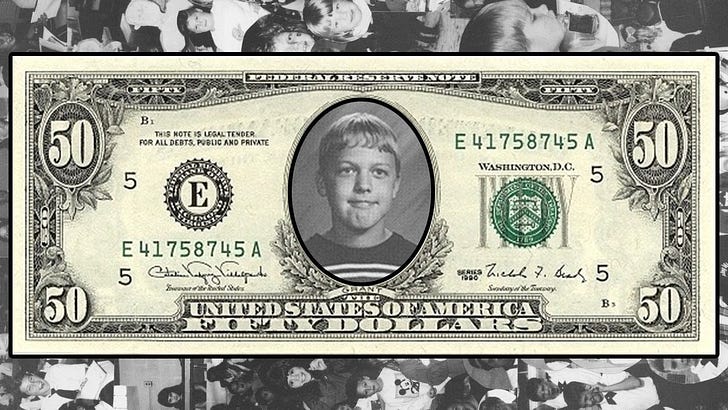When I was in elementary school, we’d have these annual fundraising drives that consisted of us, the students, going out and selling magazines. This might be familiar to you. Maybe you did it yourself. Maybe your kids did it, or still do. At my Catholic elementary school, reaching certain sales goals came with certain benefits—we could wear jeans to school or win prizes.
At the time, it didn’t dawn on my friends or I how incredibly weird this all was. We were essentially engaged in child labor. We didn’t get paid any kind of wage. We weren’t being taught anything about entrepreneurship or business. What we were learning about was status. If you didn’t sell enough, you didn’t get to wear jeans on Friday and that marked you as uncool. If you didn’t reach certain campaign-long goals, you weren’t allowed to enjoy the special limo ride and pizza party at the end of the campaign. You weren’t allowed to go in “the money machine”— a glass box with dollar bills flying around that you had to catch and slip through a little opening.
Recently, my friend Kevin Toomey made a short documentary about these fundraisers and how, to put it bluntly, fucked up it all was. (Full disclosure: He interviewed me and I’m included in it, embarrassing yearbook photos and all.) Much of the Western world focuses on extrinsic goals—things like wealth, beauty, and status, which aren’t correlated with living an authentically fulfilling life. The focus on these extrinsic goals often comes at the expense of orienting ourselves toward the intrinsic values that are correlated with living a satisfying life (feelings of competency, autonomy and relatedness).
What Kevin’s 6-minute documentary does so brilliantly is lay out one way in which these extrinsic values are taught to us early in life. These fundraisers divided kids into haves and have-nots, cool kids and not-cool kids—all largely due to things out of their control. The open secret was parents were doing all the selling, as Kevin points out. And not all parents had time to do this. I distinctly remember my own parents simply buying tons of magazine subscriptions just so I could wear jeans. Not everyone’s parents could do that! I was very lucky!
What Kevin’s research showed was the fundraiser was really just an elaborate business venture. Despite being sold as a way to raise money for the school, most of the revenue went to the company facilitating the drives. In my opinion, it’s an extremely gross manifestation of the worst capitalism has to offer and an example of how we’re being taught to focus on the very wrong things at a very young age. Please give it a watch. It’s very good and very important.




These have been around way longer than the 90s. I remember them from the 70s and 80s. I am still skeptical of any school fundraiser and would rather just make a donation so the school gets all the money, but of course that messes up the game for the kid. (It also means I’ve turned into my parents, who would never let us sell stuff in elementary school for much the same reason.)